|
Main Road
Sundridge
https://whatpub.com/lamb
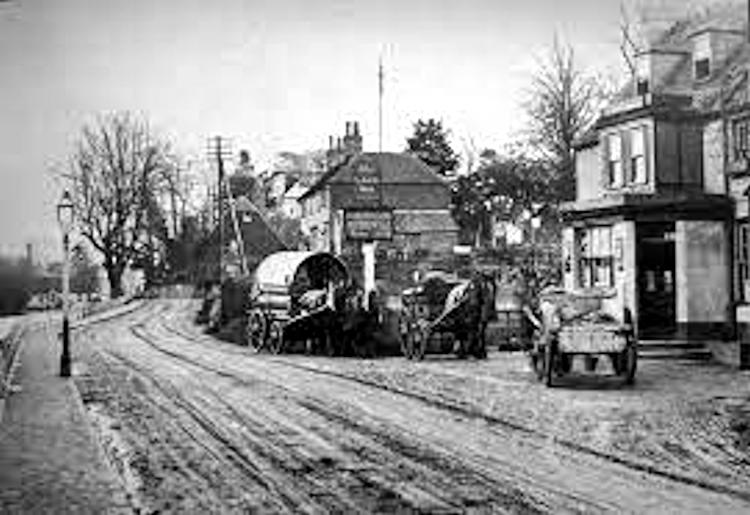
Above photo, circa 1900. Kindly sent by Rory Kehoe. The Lamb is shown
in the livery of Bushell, Watkins & Smith's Black Eagle Brewery,
Westerham, hence the sign outside advertising their Westerham Ales. |
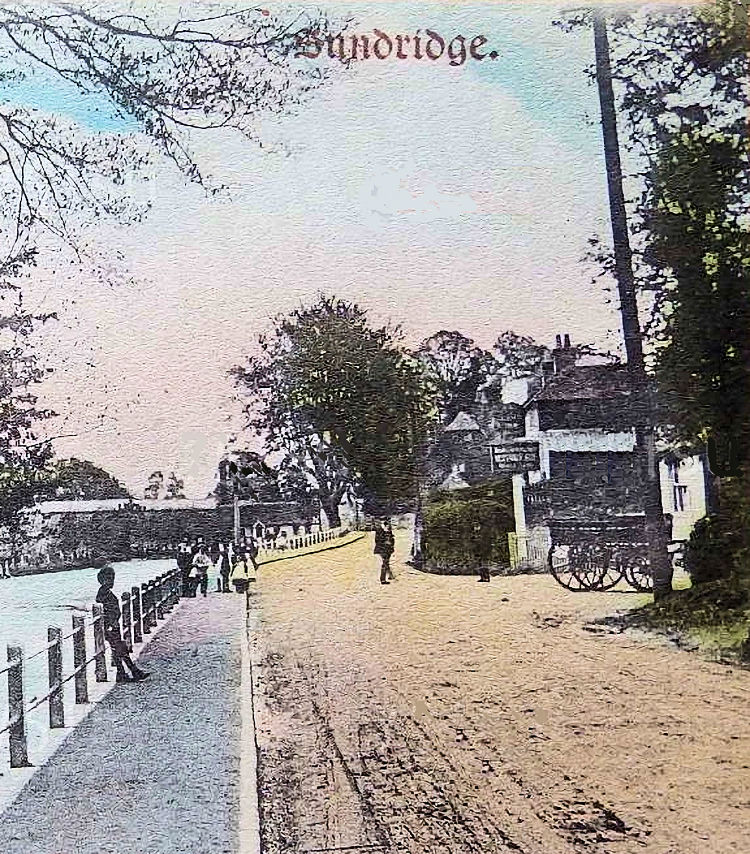
Above photo circa 1903, kindly sent by Rory Kehoe. Throughout the
Victorian period, the Lamb had been one of 25 pubs within the tied
estate of Alfred Smith's Old Brewery, Sevenoaks. In 1899, this company
was taken over by Bushell, Watkins' Black Eagle Brewery, Westerham and
the Old Brewery was closed soon afterwards. Thereafter, the Lamb was
tied to what became known as Bushell, Watkins & Smith and sold their
Westerham Ales. |
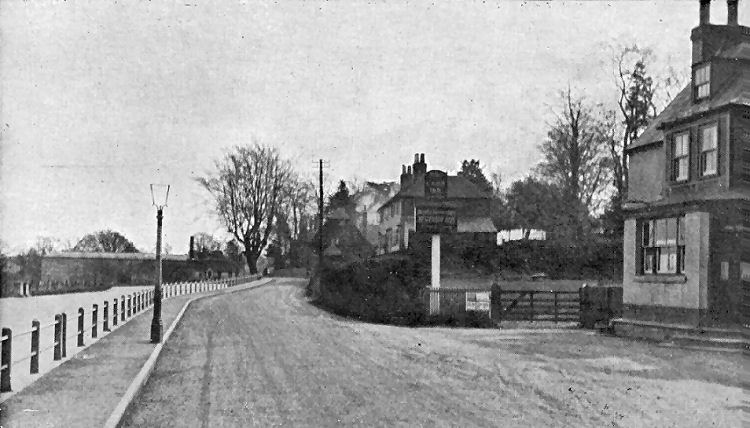
Above photo, circa 1909, kindly sent by Rory Kehoe. |
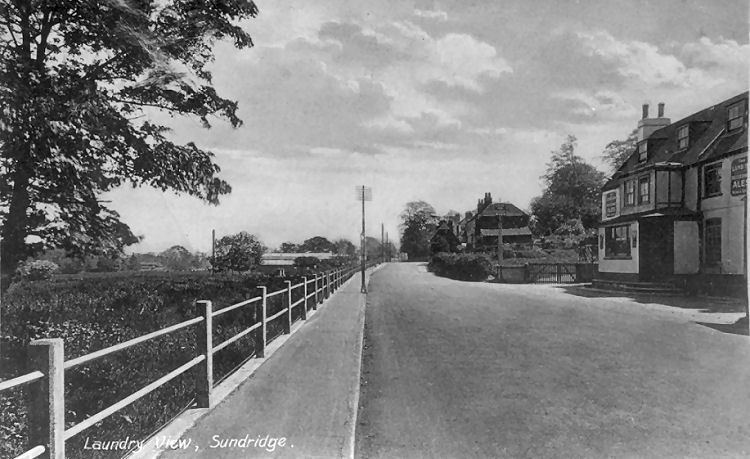
Above postcard, circa 1940, kindly sent by Rory Kehoe. |
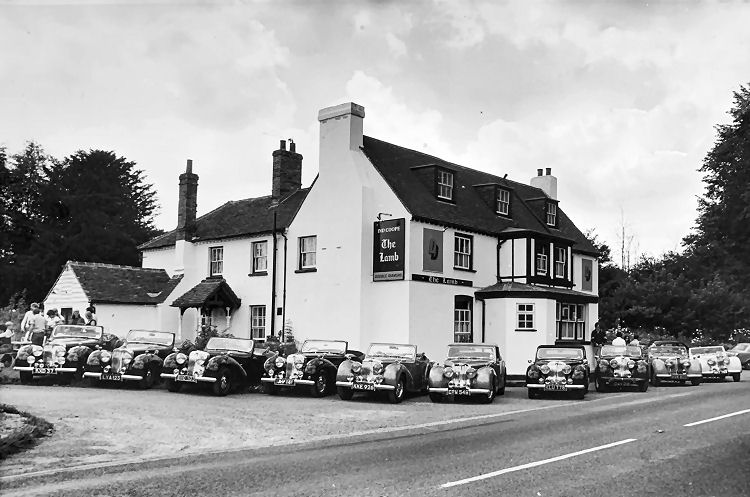
Above photo showing the Triumph Roadsters parked outside circa late 1960's.
The local branch of the club used to regularly meet up here and out
of the ten Roadsters seven are still alive and well and known to the
club, three of them are now located in mainland Europe and another in
Angus, Scotland.
Kindly submitted by Mick Pepper. |

Above photo, date unknown by Darkstar. |
|
From the Kentish Gazette, 11 September 1810.
KENT.
TO BREWERS, DISTILLERS, INNKEEPERS, AND OTHERS.
Two capital INNS, one PUBLIC HOUSE, four other HOUSES, and several
parcels of extremely valuable LAND, in the parishes of Farnborough,
Otford, Sevenoaks, Sundrish, and Chevening.
THE WHOLE FREEHOLD. TO BE SOLD BY AUCTION. By G. HOOPER, AT the
"WHITE HART INN," Riverhead, in the parish of Sevenoaks, on Monday,
the 24th day of September, 1810, at one o’clock, (subject to such
conditions of sale as shall be then and there produced;) the
following Very desirable FREFHOLD ESTATES, in Thirteen LOTS.
Lot 1. An excellent and well-accustomed INN, called by the name or
sign of the "White Lion," with suitable stables and other buildings,
and a large garden adjoining.
The whole premises contain two roods, thirty two perches, little
more or less, are now occupied by Mr. James Fuzzey, and situate at
Lock’s Bottom, in the parish of Farnborough, thirteen miles from
London, and contiguous to the Turnpike Road, leading from thence to
Tonbridge Wells and Hastings.
Lot 2. Two parcels of rich MEADOW LAND, one whereof contains one
acre, one rood, thirty-right perches, and the other two roods,
twenty-eight perches, little more or less, situate at Lock’s Bottom
aforesaid, adjoining lot 1, and in the occupation of the said James
Fuzzey.
Lot 3. A very valuable parcel of WOOD LAND, called Goddendean Wood,
plentifully stocked with thriving Oaks, containing thirteen acres,
one rood, thirty-eight perches, little more or less; also situate at
Lock's Bottom, adjoining the two last-mentioned lots, and in the
occupation of the said Janes Fuzzey.
This spot, being healthy, pleasant, and within a short ride of
London, affords a beautiful situation for building a villa.
Lot 4. A very valuable parcel of LAND, in four incisures, two
whereof are meadow, one small shaw, and the rest arable, containing
in the whole nine acres, three roods, five perches, little more or
less, situate adjoining the London road, near Longford Mill, in the
parish of Otford, and in the occupation of James Foot.
Lot 6. A MESSUAGE or TENEMENT, and GARDEN, also adjoining the London
road, situate in Riverhead, in the parish of Sevenoaks, in the
occupation of Mr. N. M. Jackson.
Lot 6. Five several inclosures of valuable LAND, whereof one is
pasture, two are meadow, and two arable, containing together
fourteen acres, one rood, four perches, little more or less, situate
near Sundrish Mills, in the parish of Sundrish, in the occupation of
Mr. James Foot.
The river Darenth intersecting these premises, affords good fishing,
and a constant opportunity of flowing the land.
Lot 7. Part of two inclosures of excellent MEADOW LAND, called the
Great Marsh and the Slip, as the same are now stumped out,
containing together three acres, one rood, nine perches, little more
or less; situate at Sundrish aforesaid, adjoining to the Turnpike
Road, and divided from lot 6, by the river Darenth; also in the
occupation of Mr. James Foot.
Lot 8. A parcel of excellent MEADOW LAND, called the Little Marsh,
part of the Great Marsh meadow and of the Landway, as the same are
now stumped out, containing together two acres, two roods, ten
perches, little more or less; situate, at Sundrish aforesaid
adjoining to lot 7, and in the occupation of the said James Foot.
Lot 9. A very excellent, substantial, and well-accustomed PUBLIC
HOUSE, called by the name or sign of the
"Lamb," with good stables,
and other convenient buildings, remarkably well situated for trade,
in the pleasant village of Sundrish, adjoining the Turnpike Road
leading from Riverhead to Westerham; good garden and orchard, well
planted with thriving fruit trees, together with a parcel of capital
MEADOW LAND, all contiguous, and containing two acres, one rood,
thirty-nine perches, little more or less, in the occupation of Mr.
James Jones.
Lot 10. A very valuable piece of MEADOW LAND, called the Lamb Mead,
containing one acre, one rood, twenty-two perches, lying immediately
opposite to lot 9, bounded on the south by the river Darenth, close
to the Turnpike Road, and in the occupation of the said James Jones.
Lot 11. A COTTAGE and excellent GARDEN, very pleasantly situated at
Sundrish Cross, in the village of Sundrish, also adjoining the
Darenth, containing nearly a quarter of an acre, in the occupation
of Henry Gander.
Lot 12. Two MESSUAGES, TENEMENTS, or COTTAGES, with a small piece of
Ground adjoining, situate in Chipstead-street, in the parish of
Chevening, in the several occupations of Thomas Barham and Thomas
Harris.
Lot 13. A very capital FREEHOLD ESTATE, being a well established INN
and POSTING-HOUSE, called the "White Hart," with spacious and
commodious stables recently erected, and other buildings and
accommodations, well calculated for the purpose of an Innkeeper.
These premises are most advantageously situated at Riverhead,
twenty-two miles from London, on the much frequented road leading
from thence to Tonbridge Wells and Hastings, in the occupation of
Mr. James Foot.
The above Estates may be viewed by leave of the respective tenants,
and the purchasers will be entitled to possession at Michaelmas
next.
Further particulars may be had of the Auctioneer, or of Mr. Crow,
Solicitor, Sevenoaks, at whose Office plans of lots 1, 2, 3, 4, 6,
7, 8, 9, and 10, may be seen.
|
|
Kentish Gazette, 17 March 1857.
ARSON.
John Richardson (on bail) for setting fire to a dwelling-house, with
intent to injure Rebecca Killick, at Sundridge, on the 16th
December.
George Hod, stated that on the 16th December last he was on his way
from Brasted to Riverhead. When he got opposite the prisoner's
house, at Sundridge, he observed smoke coming out of one of the
windows. He got out of his cart and tried the door, but could not
get in. He then burst the shop-door open. In a recess in the shop he
found a rope (produced) burning. There were tiles to the roof of the
shop. The recess of the room was in the shop. It was just beginning
to flare up. He pulled it down. There was no other fire in the shop.
The front rooms upstairs were full of smoke, which prevented him
from going into any other room. When he went in, there was no one
there. When he came down again Richardson’s son was there. The smoke
upstairs could not have come from the rope, as there was not
sufficient from it.
Frederick Watts, constable, stated that on hearing that there was a
fire at Richardson’s house, he went there, but the fire had been
extinguished. He went to a backroom upstairs and found some things
there which had evidently been burnt. In the shop he saw the rope
produced, which smelt of turpentine. The fire up in he backroom
could not have been caused by the rope, which was in the recess
projecting into the shop. He found the prisoner in a privy. He was
not sober, and appeared to be stupid. On telling him what had
occurred, he said he had not heard anything of it. He said he had
been to Sevenoaks, and had not been in his house since he started
for Sevenoaks at nine in the morning, he asked him where he got the
coat that he had on, as he had not got it when he went to Sevenoaks.
He said that was his business. He said it looked very suspicious
against him, and he took him into custody.
Cross-examined:— I did not see any furniture in the room upstairs.
The clothes that had been hanging round the room were burnt, and the
door was blistered.
Richard Stringer stated that he was employed at the "Lamb Inn,"
Sundridge. About half-past four in the afternoon of the day in
question the prisoner told him he had lost his hat, and asked him to
lend him a cap to wear home, he lent him a paper cap similar to that
produced, he was intoxicated.
William Sutton, constable, Sundridge, stated that he saw the
prisoner about half-past four on the day of the fire going from the
back way of the "Lamb" towards his home. He was wearing a cap like
the one produced.
Superintendent Handley stated that on the 17th December he went to
the Sevenoaks lock-up. He said to the prisoner, "Richardson, I am
very sorry to see you here. I see by the book there is a very
serious charge against you." He said, "I know nothing about it." He
went to the prisoner's house at Sundridge, and in a front room
upstairs he found the cap produced lying on the floor. He went to
the lock-up again, and prisoner said he went home after he left the
"Lamb." He said he did not take any of his clothes; he only went in
for his great coat; the he was going to Ide Hill, but he was so
drunk that he laid down, he denied having been up-stairs; but on
witness saying he must have been, as the cap was found there, the
prisoner said when he was in that state he could not recollect
anything. He took something from the prisoner’s pocket-book. When he
got back to the house, he found a man in possession of the
prisoner’s goods.
William Ingram, builder at Sundridge, and agent to Mrs. Killick,
stated that before the fire, about a year or a year and a half ago,
the prisoner was in a very excited state, and he went up to see him.
The prisoner ordered him off the premises, and said he should do
what he liked; and if he thought proper he should burn the house
down.
Cross-examined:— What the prisoner said was as near that as
possible. It made no impression on his mind.
The jury, without troubling Mr. Ribton to address them for the
defence, said they did not think the case properly made out, and the
prisoner was therefore acquitted.
|
|
Maidstone Telegraph, Rochester and Chatham Gazette, Saturday 13th June 1860.
Sevenoaks. Attack on the police.
On Wednesday, Henry Fuller, Peter Whitehead, James Bartholomew, and
Henry Greenway, labourers, residing at Sundridge, were charge before W.
Lombard and C. R. C. Petley, Esqs., at the clerk's office, with
assaulting Superintendent Coleman in the execution of his duty at
Sundridge, on the night of the 18th of June.
The Superintendent said that on Monday evening, at about 7 o'clock, he
was driving towards the "Lamb Inn," Sundridge, where there was a club
held, when he saw the prisoner Fuller and another person fighting. He
ordered them to desist, but as they did not, he alighted and stopped
them, and Fuller's friends came and took him away.
Sometime afterwards the publican came to him and wished him to go and
speak to Fuller, as he had come back and was going to fight. He sent
P.C. Martin, but hearing afterwards that Fuller was fighting he went to
the place and found the Constable reasoning with him. He (Mr. Coleman)
told Fuller that if he continued his disturbance he would be locked up.
Fuller then struck the officer a backhanded blow on the breast, and with
an oath asked him what he had to do with it. He then, with the
assistance of Martin, who was the only Constable present, took him into
custody.
As they were conveying him to the cage in the village he was so
exceedingly violent, kicking and fighting, that the Superintendent sent
for the Constable who had charge of his horse and cart, but previous to
his arrival Fuller had kicked the officer in the mouth, and in several
parts of the body.
On the road to the cage Greenaway attempted to rescue the defendant, and
struck Coleman over his arm to make him lose his hold; Bartholomew who
was also guilty of the like conduct.
There was a crowd of persons, and when in the village near the cage
Whitehead come up and, and squaring up to the Superintendent said with
an obscene expression, that he had waited for some time to have a turn
at him, and struck him several times.
There were between 2 and 300 people following, and it was with great
difficulty that Fuller was got into the cage.
The other defendants were apprehended the same night.
The Superintendent's statement was corroborated by the constables, and
it appears also that they had been kicked.
The defendant offered no defence, but expressed a hope that they might
be let off lightly.
Fuller was fined £5 5s., and 8s. costs, or 2 months' hard labour; the
other defendants were fined £2 10s. each, with 8s. costs, or 2 months'
hard labour.
All the defendant's paid the money.
|
|
From the Kent and Sussex Courier, Friday 24 September 1886.
Three men and a woman was sentenced to 14 days' hard labour for
stealing a bottle of Ginger Beer, value 8d., from the "Lamb Inn," Sundridge.
|
|
From Sevenoaks Chronicle and Kentish Advertiser 25 May 1888.
A LANDLORD DRUNK.
Edwin Cronk, landlord of the "Lamb Inn," Sundridge, was charged with being
drunk and disorderly at Sundridge on 23rd May, and was fined £2 and
costs, or a month. The Chairman said he did not think a publican who got drunk was a fit
person to keep a public house. |
|
Sevenoaks Chronicle and Kentish Advertiser, Friday 31 August 1888.
The "Lamb Inn," Sundridge.
Mr. Warner, Solicitor said he appeared on behalf of the owners of the
"Lamb Inn," Sundridge, to say that Mr. Cronk was leaving the house, and
a new tenant for the name of Pattenden, who was a very respectable man,
had taking it. Under the circumstances he would ask the Bench to adjourn
the consideration of the licence until the next meeting. The Bench
considered there was no objection and they adjourned the consideration
of the licence.
|
The pub closed, date unknown and was converted into a Chinese restaurant.
LICENSEE LIST
AKEHURST James 1828+

TODD/LADD George 1841+ (age 40 in 1841 ) )
NEWMAN Cornelius 1858+
LEANEY Samuel 1871+ (age 58 in 1871 ) )
LEANEY Edwin 1874-82+ (age 41 in 1881 ) )
CRONK Edwin to Aug/1888
PATTENDEN Alfred Aug/1888-91+
RECORD Joseph 1901+ (age 40 in 1901 ) )
RECORD James 1903+

HICKS Henry Joseph 1911-13+ (age 26 in 1911 ) )
ANNELLS William H 1918-22+
DEARMAN James 1930+
BEDFORD Robert J 1938+
https://pubwiki.co.uk/Lamb.shtml
http://www.closedpubs.co.uk/lambinn.html
 From the Pigot's Directory 1828-29 From the Pigot's Directory 1828-29
 From the Kelly's Directory 1903 From the Kelly's Directory 1903
 Census Census
|





